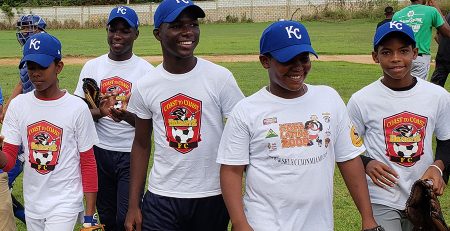A Family Story
In southern Ethiopia, between attacks from Egypt and Italy, after Ethiopia was reunified, but before Europe recognized it as a legitimate nation, Babo Bachore Helemo was born. The year was 1880 and his was a successful family of influence. By middle age, Babo had established himself as a pillar in the community. He moved comfortably within regional circles of government, commerce, and culture. A member of the state-approved church, Babo had four wives, 35 children, was well liked and admired, until, well, everything changed.
A missionary introduced Babo to Jesus, and this successful Ethiopian man fell in love with the Lover of his soul. Despite the veneer of societal success, Babo had longed for more. Dry religious ceremony and secular customs offered no life. The person and work of Jesus quenched Babo’s spiritual thirst. From that point on, Babo shared The Good News at every opportunity.
Similar to Jesus’ earthly ministry, those empowered by the traditional religious system rejected Babo’s radical message of followership, but to the poor in spirit, they could not get enough of this Living Water. Babo soon became Pastor Bachore, one of southern Ethiopia’s leading circuit riders, traveling horseback village to village like an African John Wesley. Since Babo could not read, his ten-year-old, schooled son, Mesfin, rode on the back. At each stop, the boy would climb down from the saddle and begin to read from God’s Word.
In rural Ethiopia, the opportunity to see a Bible up close was a novelty. To hear the Truth of God’s Word read by a child? That was mind blowing, almost as if God had supernaturally transported a spiritual guide into their presence as He did for another Ethiopian man centuries before in the book of Acts, chapter 8.
Large crowds gathered. After reading, Mesfin would hold the horse, while his father preached Jesus – not religion, church, or clean living – but The Good News of a holy God who became man to take our sin and punishment in a divine exchange for His righteousness and peace. The Message resonated. Repentance, acceptance, worship rose from the hearts of the broken to the throne room of heaven. Revival. Community by community, Pastor Bachore and Mesfin shared the Jesus of the Bible, and the Kale Heywet (Word of Life) church was born. Individual lives, families, even the region began to change.
Mesfin was hanging out with his dad, seeing new places, experiencing the excitement of large crowds, and witnessing a movement of God. He was living every boy’s dream, but when asked about what he remembers most, he’ll take you back to a private, family gathering with his father’s four wives and 35 children.
At the meeting, Babo told his family he had been living in ignorance. He would provide for all of his children and their mothers, but that God’s design for family was one husband and one wife. He would let the wives decide, but once decided, he would be faithful to one woman for life. Evidently, the elder wives deferred to the younger wife in a scene that stretches our American minds, but Mesfin remembers the transition as being successful and smooth. What impressed Mesfin the most was the Gospel trumped strong cultural norms and made a tangible difference in the life of his father and family.
In foreign countries, it’s easier to identify where cultural influences sideline Biblical directives. When dealing with ourselves and our own communities, we are more easily sidetracked. As Jesus taught, perhaps taking the log out of our own eye is a necessary first step. Regardless of cultural backdrop, when the Gospel revives a life, it is beautiful; and so it was in the Bachore family. Yet, to those “in charge,” this Word of Life movement championed by Pastor Bachore was threatening, unwelcome, and had to stop.
As King Darius’ court did to Daniel and the Sanhedrin did with Jesus, the local system trumped up charges. The establishment wanted Pastor Bachore and his circuit-riding ministry off the streets and out of the disciple-making business. Like their historical predecessors, they succeeded, in part. Pastor Bachore did go to jail, only to find more people there who needed Jesus. Similar to Paul’s ministry in Rome, Babo started the next Kale Hewyet Church, the 41st in the movement overall and the first behind bars.
Back at home, one of Pastor Bachore’s daughters, a little girl named Zewudie (Zowdy), found it difficult to celebrate. On Sunday, other little girls got to be with their daddies. She didn’t. She missed him. All she had known since she was three years old was that her Dad was in jail because of his church work. That’s quite a tough message for a girl longing for her Daddy’s hugs.
One day, when she was about nine or ten, Zewudie and the other girls were playing together.
“When I grow up, I’m going to have six kids,” declared one girl.
“8,” boasted another.
“10!” said a third.
One then asked,“Zewudie, how about you?”
“I don’t know,” began the pensive child. “Maybe, since you all are having so many, I will help care for yours.”
Zewudie’s life did brighten. The jailers, overwhelmed by the growing church inside their walls, ultimately released her dad back to the family; concluding he would actually do less damage outside than in. Later, missionaries helped open doors to high school in the capital city of Addis and ultimately college in Northern Iowa, but even with things beginning to go her way, Zewudie was not at peace.
In the early 1970’s with a college degree in hand, she longed to return to Ethiopia.
“You can’t,” was the caution from brother Mesfin, as well as Zewudie’s sister. “The Socialists are now in power, and they make life very difficult for anyone returning from the U.S.” So Zewudie stayed.
She became a COBALT programmer and made a life in America. In the early, 1990s, Mesfin joined her in Kansas City, but even her brother’s arrival did not dull Zewudie’s desire to see her homeland. In 2005, she got her wish, returning to Ethiopia for the first time in more than three decades.
Things had changed, or so it seemed. For the first time, Zewudie was acutely aware of street children, who seemed to live hand-to-mouth, unsupervised lives.
“Who cares for these children?” Zewudie asked. “Why doesn’t someone help them? Is the government not doing anything?”
Her friends tried to get her to be quiet.
“You mustn’t talk that away,” they counseled. “C’mon on. Let’s go. Keep moving.”
Zewudie returned to the States, but the peace she had hoped to find was still absent. In fact, the hole inside her seemed even larger. Nights were restless. Faces of parentless children lodged in her mind, and she cried out to God. God answered.
“Zewudie, remember when you said you would care for the children of others?”
The Lord was taking Zewudie back to the words she uttered as a pensive girl on the playground with her friends.
“Zewudie, go back to Ethiopia. Care for my children,” the Lord said. And, she did.
In 2007, Zewudie returned to Ethiopia. Moving away from first-world medical care, a successful career, and family who had moved to the US, many thought she was crazy. At times, Zewudie agreed, feeling like she was literally walking away from life itself, but God has been faithful.
 In 2012, GO Project met with Zewudie Bachore in Ethiopia through a connection we had made with brother, Mesfin, at a lunch in Olathe. (pictured here) We already had an anchor partner in country, a large Kale Hewyet Church in Hosanna that Mesfin and Zewudie Bachore’s father helped start more than fifty years earlier. (Click here>> to learn more about Hosanna) Our initial meeting with Zewudie resulted in plans for an improved school and homes for children that Zewudie had been helping in a rural community of Koncko. (Click here>> to learn more about Koncko)
In 2012, GO Project met with Zewudie Bachore in Ethiopia through a connection we had made with brother, Mesfin, at a lunch in Olathe. (pictured here) We already had an anchor partner in country, a large Kale Hewyet Church in Hosanna that Mesfin and Zewudie Bachore’s father helped start more than fifty years earlier. (Click here>> to learn more about Hosanna) Our initial meeting with Zewudie resulted in plans for an improved school and homes for children that Zewudie had been helping in a rural community of Koncko. (Click here>> to learn more about Koncko)
Woyita Olla, one of the current leaders in Ethiopia’s now 7.5 million person Kale Hewyet Church denomination, was also recently at our GO Project offices. Despite the encouraging ministry advances, while here, he shared a heavy heart with our GO Project team. He fears we in the US think we live for ourselves, by ourselves apart from the rest of the world. It’s not true, he said. He told us the world is wondering how America with such a strong church could accept moral erosion from within. Perplexed Woyita watches TV showing tens of thousands in Paris protesting secular attempts to mute God’s design for marriage, while the U.S. seems to celebrate with parades as the pendulum swings. Others accurately cite America as the world’s largest producer and exporter of pornography. I share these concerns, but I wonder if our country’s and our church’s most damaging exports might be actually apathy and individualism.
We tend to view our actions in the here and now at single points in time. In reflection, we might see life as a series or string of events. In reality, individual points and individual strings do not exist. Woyita points us to much larger realities. We are connected. Decisions have consequences. What one person or one church does, or doesn’t do, impacts the attitudes and lives of others; often years later in places far away.
When we have eyes to see, we realize “our” lives are not ours at all, but rather threads in the hands of the Master. He weaves them together to produce a beautiful mosaic, a work of art. His masterpiece includes Pastor Bachore sharing the Gospel across Southern Ethiopia on horseback and taking life inside prison walls. His Art encompasses playground promises of a little girls being lived out through a church planted by her father in her homeland by a beautiful lady. His invitation extends to you and me to shed our individualism and embrace a role in the bigger adventure in His family’s Story.
For more stories of God’s heart for Africa, see Ruined for the Average II: God’s Heart for Africa

